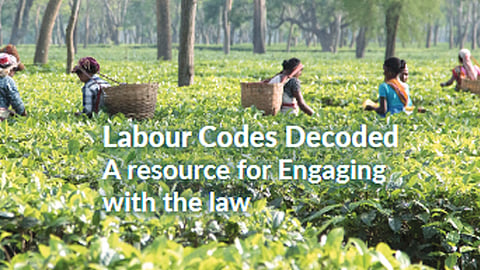
- News
- Columns
- Interviews
- Law Firms
- Apprentice Lawyer
- Legal Jobs
- हिंदी
- ಕನ್ನಡ

In 2019-20, during the peak of the pandemic, four new labour codes were passed by Indian Parliament. These codes were intended to replace 29 central laws and rules governing the Indian labour and industrial sector.
The Code on Wages received Presidential assent in 2019, followed by the Code on Social Security, the Industrial Relations Code and the Occupational Safety, Health, and Working Conditions Code in 2020. These codes are yet to commence as the Central and state rules thereunder are pending finalisation.
The reactions to the codes have been varied. Labour unions, workers and activists argue that the codes weaken workers' rights and further dilute their collective bargaining power. They note that important stakeholders were excluded from the drafting process and non-participatory approaches rendered consultations non-representational. It is further claimed that new laws are ambiguous and leave disproportionate room for interpretations.
In their opinion, excessive regulatory and accountability gaps, inconsistent delegation of duties and powers between governments and authorities further reduces workers’ access to the codes and their rights. On the other hand, reforms to the gargantuan and colonial labour-industrial laws and their complex web have been long overdue. The narrative in support of the codes also cites their potential positive impact on the ease of doing business.
For equity and justice, it is therefore essential for stakeholders and legal practitioners to develop a critical understanding of the codes. In Labour Codes Decoded, through the example of Assam’s tea industry, the authors have (a) explained the most significant concepts under the codes; (b) identified the gaps and highlighted ambiguities, and (c) established a simpler flow of information. This workbook aims to enhance the readers’ understanding of how these new laws potentially impact stakeholders within the industrial and labour law regime. Any learnings derived from this book are expected to be critical in supporting stakeholders’ informed engagement in current and future labour legislations, policies and judicial processes.
About the authors
Katyayani Chandola is a lawyer specialising in gender, business and human rights, labour laws and corporate accountability. She has worked extensively with Adivasi communities in India, especially those in Eastern UP and Assam, on community and forest rights, maternal healthcare entitlements as well as labour laws and corporate accountability. Her work focuses on community-led research and advocacy, participatory decision making, and legal capacity building for communities, from an intersectional lens.
Tripti Poddar is an advocate practicing primarily in courts in Delhi. She has litigated on issues such as Aadhaar, socio-economic rights, citizenship and refugee law in courts across India. In addition to litigating, she supports community-led advocacy and research with a focus on the right to housing, labour laws and citizenship & immigration, with the aim of making the law more accessible to marginalised groups and communities.
Labour Codes Decoded can be accessed here.